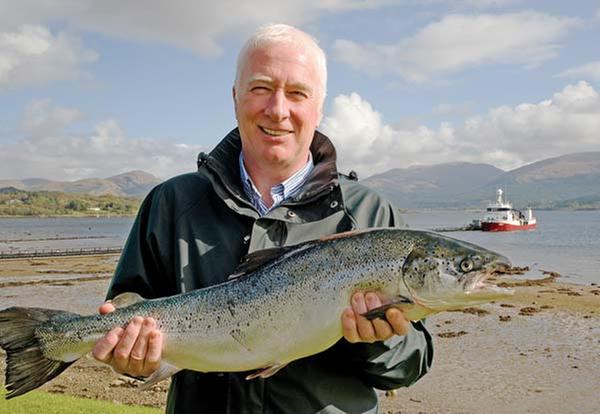Scottish salmon industry expects to see leap in exports
By BO LEUNG | China Daily UK | Updated: 2017-05-09 17:48
China has one of the world's fastest-growing appetites for fresh and smoked salmon, but Scotland's fish farmers have been struggling to keep up with demand from the lucrative market.
|

|
| Salmon expert Scott Landsburgh expects more exports. [China Daily] |
Scotland is one of the world's major suppliers of farmed salmon but the industry's growth was recently hampered by sea lice infestations that led to a drop in production.
Sea lice are a parasite that latches onto fish, seriously affecting their growth. Such fish are usually harvested before their health deteriorates, when they tend to be younger and smaller.
Figures from the United Kingdom's HMRC Revenue and Customs showed the export volume of salmon to China fell from around 11 million kilograms in 2015 to 8 million kilograms last year, something the industry attributes to the sea lice outbreak. In 2014, some 13 million kilograms of the pink-fleshed fish was shipped to the world's second-largest economy.
Despite the fall in the quantity of exports to China, the value of the industry remained high. In 2016, the value of salmon exports was around 52 million pounds ($67 million). In the previous year, it was 53 million pounds.
Beijing first allowed imports of Scottish salmon in 2011.
Industry experts said sea lice are a natural phenomenon.
Scott Landsburgh, chief executive of the Scottish Salmon Producers Organisation, said: "Sea lice are nothing new, they exist in the wild and climate change is contributing to the spread. The industry has invested tens of millions of pounds on research and development of new techniques and equipment."
He said there have been "significant improvements" and the "trend line has been coming down over the last three to six months".
"I'm confident we are on top of the issue and will be able to supply really high-quality, healthy fish to the Chinese market," he added.
Landsburgh attributed the fall in the volume of exports entirely to the early harvest.
"China likes the larger fish, around 7 kilos, but there was an early harvest last year in order to provide healthy and high-quality salmon, which resulted in smaller fish. That is why exports to China dipped a bit in 2016."
But Landsburgh expects business to pick up this year and anticipates increased productivity in the years to come, thanks to cooperation between regulators and the Scottish government as they look for ways to better meet the demand for salmon in a sustainable manner.
"China is a great market, something we are enthusiastic about, with huge potential," Landsburgh said. "Our largest company, Marine Harvest Scotland, is seeing really good demand from China this month, as May tends to be a strong month for us to supply to the Chinese market."
He said Norway, one of the UK's competitors in salmon exports, is not as active in supplying salmon during May.
Landsburgh is expecting the demand for salmon to remain robust.
"The value of the fish has held up really strong, so that indicates that there is a very strong demand," he said.
























